Top Manufacturing Analytics Softwares and How to choose best for you
Gaurav Singh Rawat
- June 25, 2024
- 12 Min Read

The role of data analytics has become increasingly crucial for businesses aiming to stay competitive and efficient. Manufacturing Analytics Software has emerged as a game-changing tool, enabling companies to harness the power of their data to drive informed decision-making, optimize processes, and boost overall productivity.
As we delve into the world of Manufacturing Analytics Software, it’s essential to understand that these sophisticated platforms go beyond simple data collection and reporting. They offer advanced capabilities such as real-time monitoring, predictive maintenance, quality control, and supply chain optimization, all of which are vital for modern manufacturing operations.
We’ll provide you with valuable insights on how to choose the best software for your specific manufacturing needs, considering factors such as scalability, integration capabilities, user-friendliness, and return on investment.
What is Manufacturing Analytics Software?
Manufacturing Analytics Software is a specialized class of business intelligence tools designed to collect, process, analyze, and visualize data from various aspects of manufacturing operations.
This software leverages advanced technologies such as artificial intelligence, machine learning, and the Industrial Internet of Things (IIoT) to provide real-time insights into production processes, equipment performance, quality control, and supply chain dynamics.
At its core, Manufacturing Analytics Software serves as a central nervous system for your manufacturing operations. It aggregates data from multiple sources, including:
– Production equipment and sensors
– Enterprise Resource Planning (ERP) systems
– Manufacturing Execution Systems (MES)
– Supply chain management tools
– Quality control systems
By consolidating this data and applying advanced analytics, the software provides a comprehensive view of your entire manufacturing ecosystem. This enables you to:
– Monitor real-time production performance
– Identify bottlenecks and inefficiencies
– Predict and prevent equipment failures
– Optimize production schedules
– Improve product quality
– Enhance supply chain visibility
– Make data-driven decisions quickly
Modern Manufacturing Analytics Software often includes features such as:
– Real-time dashboards and visualizations
– Predictive maintenance capabilities
– Quality control and defect detection algorithms
– Supply chain optimization tools
– Production planning and scheduling modules
– Integration with IoT and IIoT devices
The power of Manufacturing Analytics Software lies in its ability to transform raw data into actionable insights. It allows you to move from reactive to proactive decision-making, enabling you to address issues before they become problems and identify opportunities for improvement that might otherwise go unnoticed.

Level Up Your Production
Take your manufacturing to the next level with real-time analytics and predictive maintenance. Get started with a personalized consultation and see the difference in 60 days.
Why Manufacturing Analytics Software Important?
The market for Manufacturing Analytics Software has seen significant growth in recent years, with numerous solutions now available to cater to various industry needs. From established tech giants to innovative startups, the options are diverse and can be overwhelming for businesses looking to implement or upgrade their analytics capabilities.
Here’s why Manufacturing Analytics Software is crucial:
– Data-Driven Decision Making: Manufacturing Analytics Software provides real-time, accurate data from across your production processes. This enables you to make informed decisions based on concrete evidence rather than intuition or outdated information.
– Improved Operational Efficiency: By analyzing data from various sources – machines, supply chain, quality control, etc. – the software can identify bottlenecks, inefficiencies, and areas for improvement in your manufacturing processes. This leads to streamlined operations and increased productivity.
– Predictive Maintenance: One of the most valuable features of Manufacturing Analytics Software is its ability to predict equipment failures before they occur. By analyzing patterns in machine data, the software can alert you to potential issues, allowing for proactive maintenance. This significantly reduces costly downtime and extends the life of your equipment.
– Quality Control Enhancement: The software can track and analyze quality metrics in real-time, helping you identify and address quality issues quickly. This leads to fewer defects, reduced waste, and improved customer satisfaction.
– Supply Chain Optimization: Manufacturing Analytics Software can provide insights into your supply chain, helping you optimize inventory levels, improve supplier performance, and better predict demand. This can lead to significant cost savings and improved responsiveness to market changes.
Top Manufacturing Analytics Softwares of 2024
In the rapidly evolving manufacturing landscape, leveraging advanced analytics software is crucial for maintaining competitiveness and operational efficiency. Manufacturing analytics software helps businesses harness the power of data to optimize production processes, improve product quality, and reduce costs.
In this part of the blog, we will explore the top manufacturing analytics software of 2024, highlighting their key features, pros, and cons to help you make an informed decision.
LIO
Lio is an AI-powered platform designed to streamline manufacturing operations through rapid application development and seamless integration with existing systems. It offers customizable workflows and real-time data insights, making it a versatile tool for various manufacturing needs.
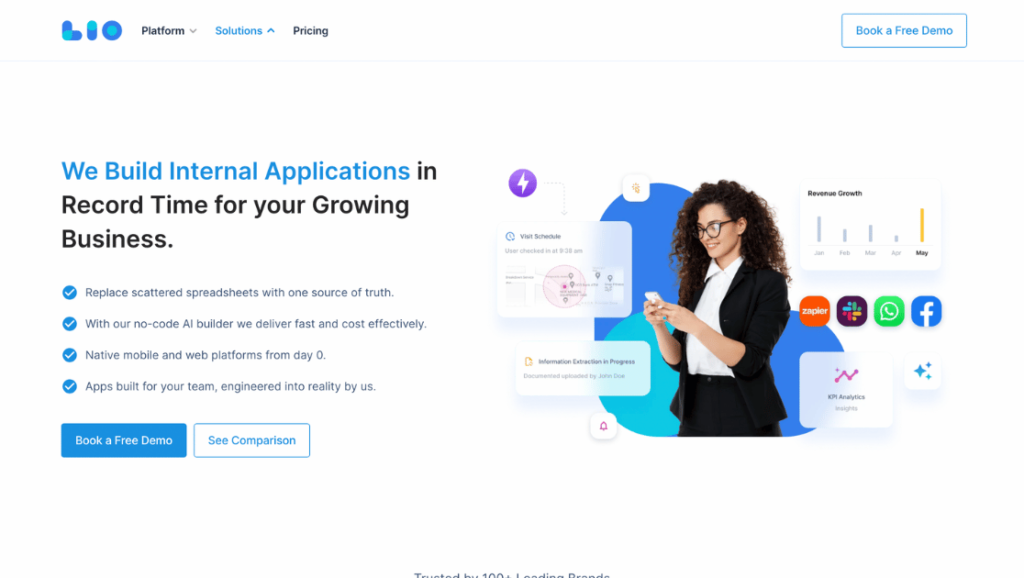
Key Features
– Rapid application development for agile manufacturing
– Seamless integration with existing systems
– Customizable workflows for flexible manufacturing
– Real-time visibility and data-driven insights
– Mobile accessibility for agile operations
Pros
– AI-powered platform for quick custom application development
– Integration with over 100 existing applications
– Cloud-based architecture for scalability
Cons
– Relatively new player in the market
– May require some technical expertise to fully utilize
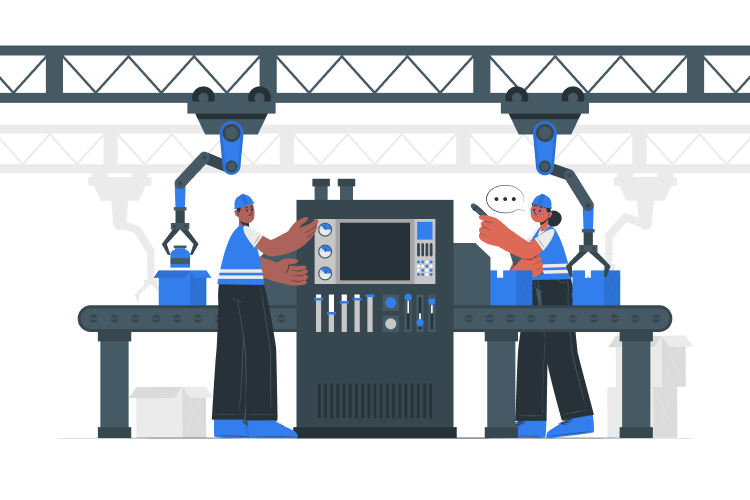
Smart Factory Solutions
Step into Industry 4.0 with Lio's advanced manufacturing analytics. Monitor KPIs, predict maintenance needs, and streamline operations all from one intuitive platform. Experience the future of manufacturing.
SAS
SAS is a leading analytics software company known for its comprehensive suite of tools that cater to various industries, including manufacturing. SAS provides robust data integration capabilities and advanced analytics to help manufacturers improve product quality, reduce costs, and enhance decision-making.
Key Features
– Enterprise quality-centric data model
– Automated monitoring & alerting
– Predictive modeling
– Advanced analysis workspace
– Reporting & KPI dashboards
Pros
– Comprehensive suite of analytics tools
– Strong reputation in the analytics industry
– Robust data integration capabilities
Cons
– Can be complex for new users
– Higher cost compared to some competitors
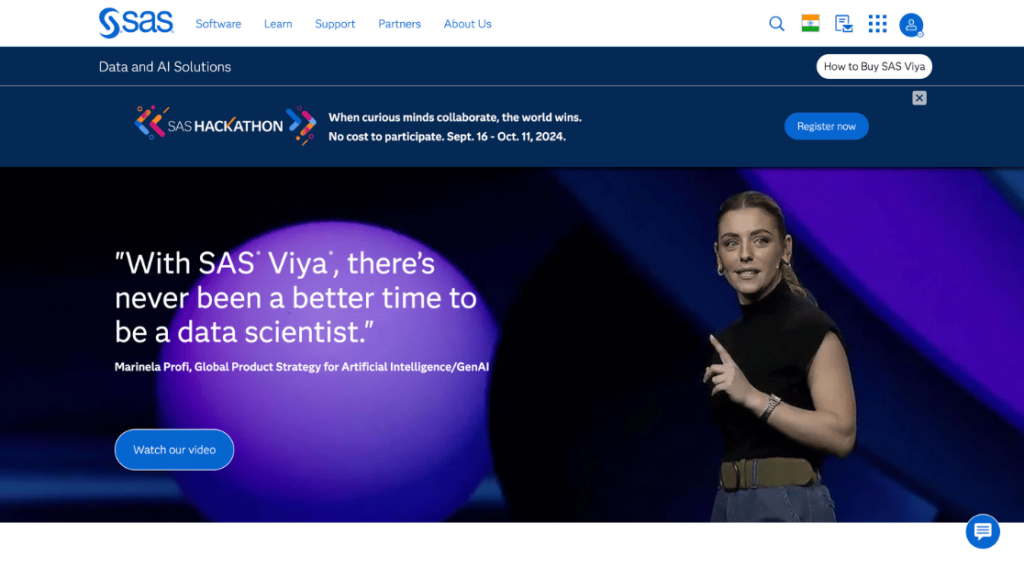
IBM Decision Optimization
IBM Decision Optimization leverages prescriptive analytics to help manufacturers optimize complex business decisions. Integrated with IBM Watson Studio, it provides powerful CPLEX solvers and a modeling assistant that uses natural language interactions, making it accessible even to non-technical users.
Key Features
– Prescriptive analytics capabilities
– Integration with IBM Watson Studio
– Powerful CPLEX solvers
– Modeling assistant with natural language interactions
Pros
– Industry-leading optimization algorithms
– Seamless integration with other IBM products
– Suitable for complex, large-scale optimization problems
Cons
– May be overkill for smaller operations
– Steep learning curve for non-technical users

Data-Driven Manufacturing
Transform raw data into actionable insights. Our manufacturing analytics software helps you make informed decisions, improve quality control, and optimize your supply chain for increased profitability.
Alteryx
Alteryx is known for its user-friendly interface and strong data preparation capabilities. It offers advanced analytics, including predictive modeling and event triggering, making it a versatile tool for both technical and non-technical users in the manufacturing sector.
Key Features
– Data preparation and blending
– Advanced analytics including predictive modeling
– Event triggering
– Analytic apps creation
Pros
– User-friendly interface for both technical and non-technical users
– Strong data preparation capabilities
– Flexible deployment options
Cons
– Can be expensive for small businesses
– Some advanced features require coding knowledge
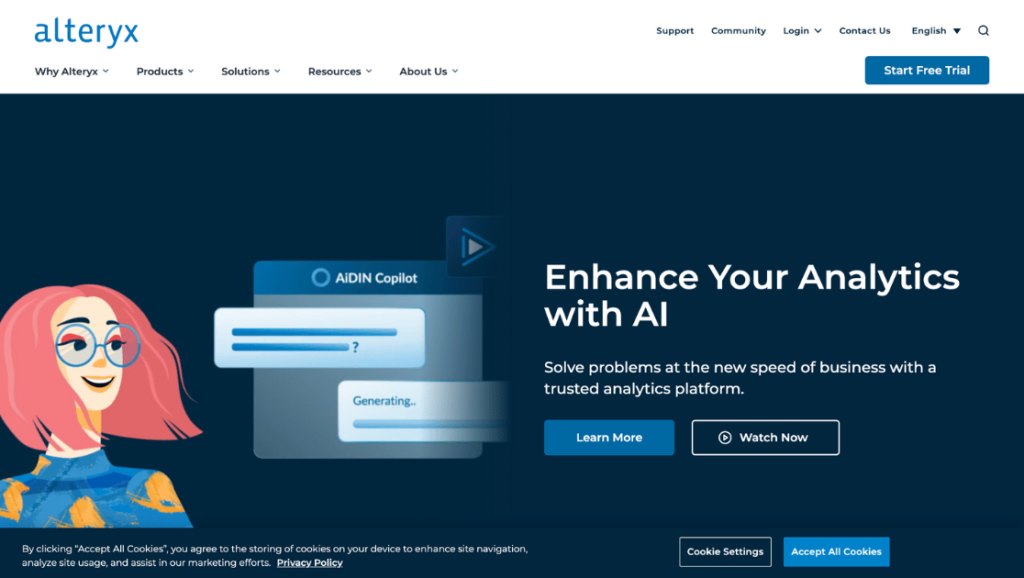
Microsoft Power BI
Microsoft Power BI is a cost-effective analytics tool that integrates seamlessly with other Microsoft products. It offers real-time data analysis and custom visualization tools, making it a popular choice for manufacturers looking to enhance their data-driven decision-making processes.
Key Features
– Real-time data analysis
– Integration with other Microsoft products
– Custom visualization tools
– AI-powered insights
Pros
– Cost-effective, especially for existing Microsoft users
– User-friendly interface
– Regular updates and improvements
Cons
– Limited advanced analytics capabilities compared to specialized tools
– Can be slow with large datasets

Unlock Factory Potential
Harness the full potential of your manufacturing data with Lio. Our analytics software helps you optimize processes, reduce downtime, and drive continuous improvement. Start maximizing your factory's performance today.
Rockwell Automation
Rockwell Automation specializes in industrial IoT integration and offers robust analytics tools for predictive maintenance, process optimization, and quality control. It is particularly well-suited for manufacturing and industrial processes.
Key Features
– Industrial IoT integration
– Predictive maintenance
– Process optimization
– Quality control analytics
Pros
– Specialized for manufacturing and industrial processes
– Strong integration with automation hardware
– Robust security features
Cons
– May be less flexible for non-manufacturing analytics
– Can be complex to set up and configure
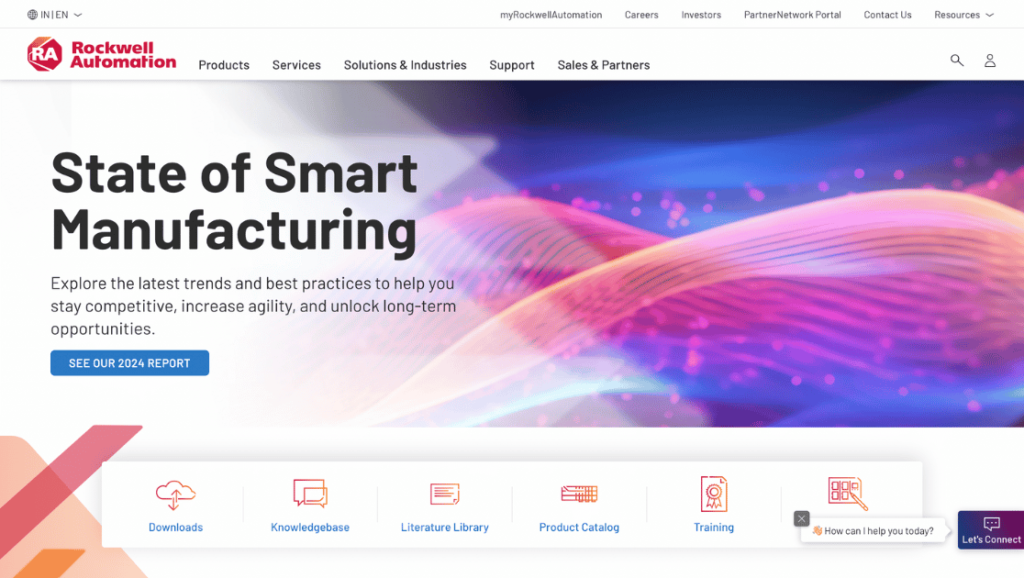
ThoughtSpot
ThoughtSpot offers AI-driven analytics with a natural language search interface, making it easy for users to gain insights from large datasets. It is known for its fast performance and strong data visualization capabilities.
Key Features
– AI-driven analytics
– Natural language search
– Automated insights
– Embedded analytics
Pros
– Intuitive search-based interface
– Fast performance on large datasets
– Strong data visualization capabilities
Cons
– Limited advanced statistical capabilities
– May require significant data preparation

Unlock Data Insights
Turn your manufacturing data into actionable insights with Lio's analytics software. Make informed decisions and drive operational excellence. Get started with a free trial!
Seeq
Seeq specializes in time-series data analytics, making it ideal for process manufacturing. It offers predictive analytics and collaboration tools, allowing process engineers to easily contextualize and analyze data.
Key Features
– Time-series data analytics
– Predictive analytics
– Collaboration tools
– Integration with historians and data lakes
Pros
– Specialized for process manufacturing
– Strong data contextualization capabilities
– Easy to use for process engineers
Key Features
– Focused primarily on time-series data
– May not be suitable for all types of manufacturing analytics
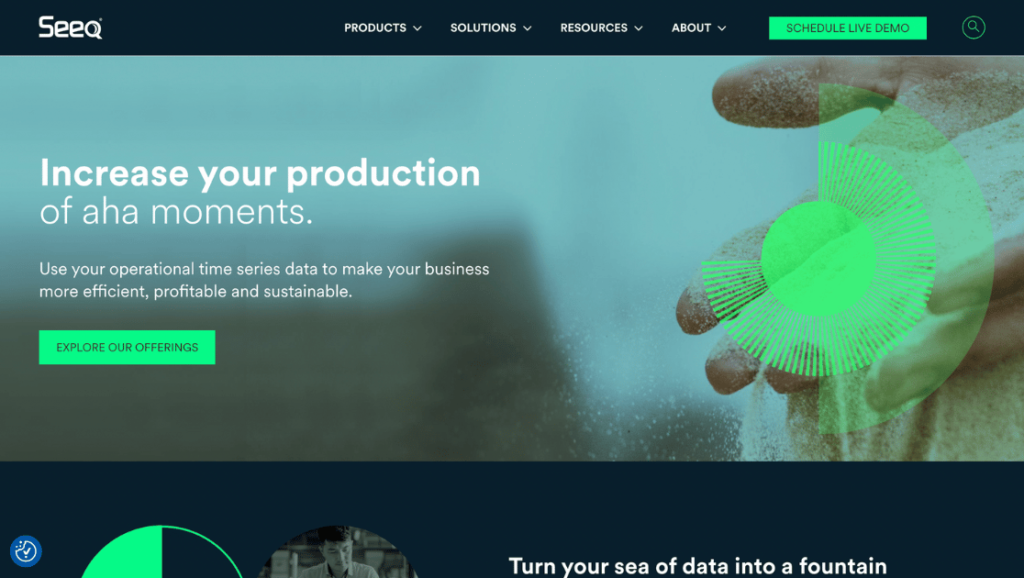
TrendMiner
TrendMiner provides self-service industrial analytics with a focus on pattern recognition and predictive analytics. It is designed specifically for process industries, enabling users to quickly gain insights without the need for coding.
Key Features
– Self-service industrial analytics
– Pattern recognition
– Predictive analytics
– Contextualization of time-series data
Pros
– Designed specifically for process industries
– No coding required for analysis
– Quick time-to-insight
Cons
– Limited to time-series data analysis
– May not be as versatile for other types of manufacturing analytics
Conclusion
The power of data-driven decision-making cannot be overstated in today’s competitive landscape, where efficiency, quality, and agility are paramount. By implementing a robust Manufacturing Analytics Software, businesses can unlock new levels of operational excellence, reduce costs, and drive innovation across their entire production ecosystem.
However, it’s important to remember that choosing the right software is just the first step in a larger journey towards data-driven manufacturing. Success with Manufacturing Analytics Software requires a commitment to data quality, ongoing training and support for users, and a culture that embraces data-driven decision-making at all levels of the organization.
As you evaluate and implement your chosen solution, keep in mind that the true value of Manufacturing Analytics Software lies not just in the insights it provides, but in how effectively those insights are translated into actionable improvements in your manufacturing processes.
Frequently Asked Questions (FAQs)
How does manufacturing analytics software differ from traditional business intelligence tools?
Manufacturing analytics software is specifically designed to handle time-series data from industrial processes and equipment, providing real-time insights into production operations. Traditional BI tools are more general-purpose and may not be optimized for the unique challenges of manufacturing data.
Can manufacturing analytics software integrate with legacy systems in older factories?
Yes, most modern manufacturing analytics software is designed to integrate with a wide range of systems, including legacy equipment. Many solutions offer connectors or APIs to facilitate data collection from older machines and systems.
What security measures are typically in place for manufacturing analytics software?
Manufacturing analytics software often includes features like data encryption, role-based access control, audit trails, and compliance with industry standards such as ISO 27001. Cloud-based solutions may also offer additional security measures like multi-factor authentication.
How does manufacturing analytics software handle data from multiple production sites?
Many manufacturing analytics platforms are designed to aggregate and analyze data from multiple sites, allowing for centralized monitoring and comparison of performance across different facilities. This can help identify best practices and areas for improvement across the organization.
What kind of training is typically required for employees to use manufacturing analytics software effectively?
Training requirements vary depending on the software and the user’s role. Many vendors offer online tutorials, documentation, and in-person training sessions. Some platforms are designed with user-friendly interfaces that require minimal training for basic use, while more advanced features may require more extensive training.
How can manufacturing analytics software help with regulatory compliance?
Manufacturing analytics software can automate data collection and reporting required for regulatory compliance, such as quality control records or environmental monitoring. It can also provide audit trails and help identify potential compliance issues before they become problems.
What is the typical return on investment (ROI) for implementing manufacturing analytics software?
ROI can vary widely depending on the specific implementation and industry. However, many companies report significant benefits such as reduced downtime, improved quality, and increased productivity. Some vendors claim ROI within months of implementation, but it’s important to conduct a thorough analysis based on your specific situation.
How does manufacturing analytics software handle data quality issues?
Many manufacturing analytics platforms include data cleansing and validation features to identify and correct data quality issues. This may include automated outlier detection, data normalization, and the ability to flag or exclude suspicious data points.


